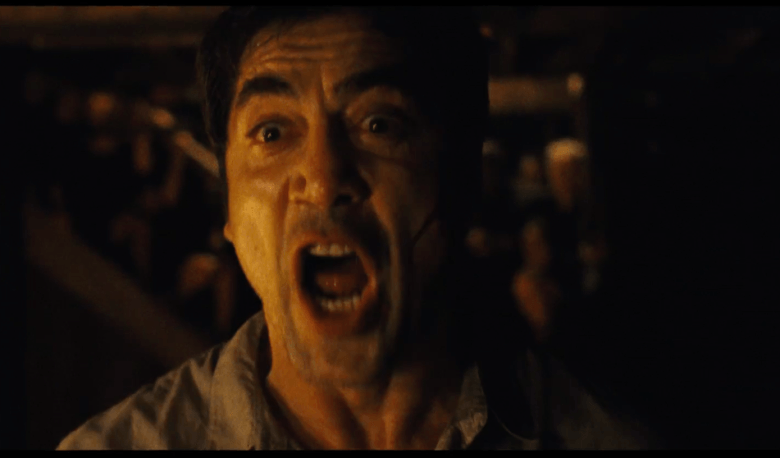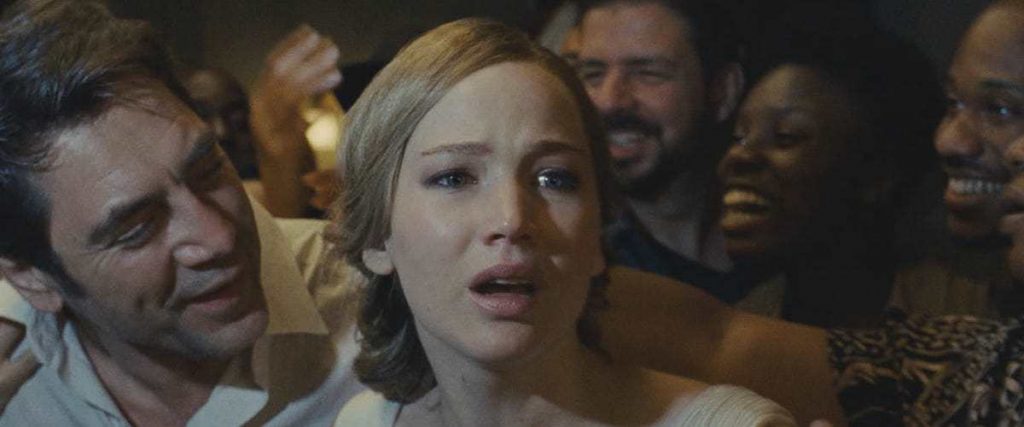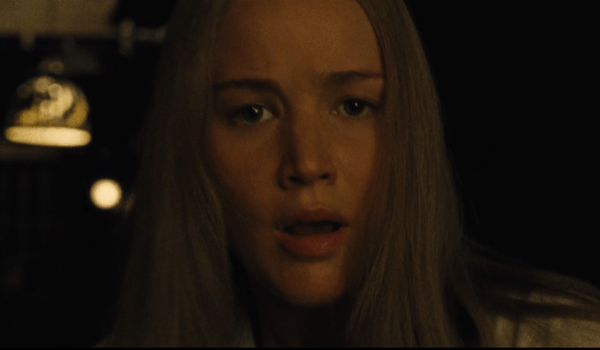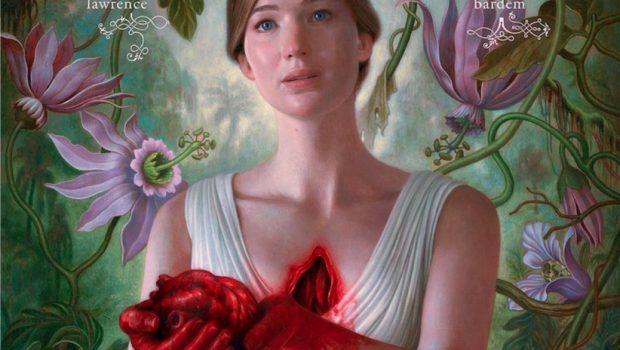Mother! – Film Review
Reviewed by Damien Straker on the 29th of September 2017
Paramount presents a film by Darren Aronofsky
Produced by Darren Aronofsky, Scott Franklin and Ari Handel
Written by Darren Aronofsky
Starring Jennifer Lawrence, Javier Bardem, Ed Harris and Michelle Pfeiffer
Cinematography Matthew Libatique
Edited by Andrew Weisblum
Running Time: 120 minutes
Rating: MA15+
Release Date: the 14th of September 2017
In recent weeks, Darren Aronofsky’s new film Mother! has had cinephiles and various websites attempting to dissect the story’s underlining meaning. However, the various interpretations and readings drawn from this film will always remain secondary overall to the incredulous story and slapdash execution. The characters in Mother! are completely undercooked and lacking in extra dimensions, meaning that any obvious or broad “insights” into celebrity culture are little more than superfluous window-dressing.
Despite having an impressive, promising cast featuring Jennifer Lawrence, Javier Bardem, Ed Harris, Michelle Pfeiffer and Domhnall Gleeson, this marks a serious misfire from Aronofsky, who in the past has skilfully matched his stylistics choices with the flesh and blood of engrossing character studies. As a continuation of his expose of mental and physical deterioration, a common staple of his filmography, this isn’t the film one hoped for or expected from him.
As a filmmaker, Aronofsky has always retained a serious eye for provocative imagery that few could ever doubt. Black Swan (2010) used its Gothic iconography and stylistic trimmings to show the obsessiveness with perfection and artistry, allowing the film to become one of the director’s best and most commercially successful films. However, despite employing similar formal devices that worked in Swan, the visual choices here aren’t supported by a good script.
One example is Aronofsky’s decision to shoot much of the film with a handheld camera in tight close-ups. This worked in Swan to show the obsessiveness of an artist being pursued by fear and perfection. Here the camera photographs the back of Jennifer Lawrence’s head and then glues to her face for extended periods, albeit with no clear purpose. The repetition of the shot lessens its emotional impact and pressures the actress to be expressive, which is not always possible given the underdeveloped nature of the character.
Some nifty visual effects in the film’s opening scenes, specifically the ashes of a dilapidated house reversing in time, falsely suggest that Aronofsky hasn’t lost his touch for visual stylisations. Yet despite possessing similarly grainy textures as Swan, Mother! is washed out, colourless and grey for no apparent reason. Meanwhile, strange images, such as a beating heart and a woman surrounded by flames, are little more than eye-catching showmanship.
The most recognisable quality missing from Aronofsky’s storytelling is patience. The film is immediately effective at unsettling us, using long unbroken takes to follow the character Mother (Lawrence) between rooms without cutting. However, this heightened emotional charge typifies the exhausting decision to immediately favour tense mood-building over character and pacing; there’s too few breathing spaces early on to let the creepiness slowly sink in.

Furthermore, there are basic questions in Aronofsky’s weak screenplay that are unresolved and deserved as much time as the amount dedicated to his filmic choices. For example, why Mother is reluctant to tell her husband Him (Bardem) that she is pregnant and hides it from him remains unclear. Likewise, Him’s contradictions are annoying and illogical.
He is a struggling writer (sigh) who is extremely protective of a crystal object salvaged from when his house burnt down and he lost everything! Yet how did these two characters come to live by themselves in a laughably oversized family house in the middle of nowhere and how have the two of them alone been able to renovate it after this apparent blaze? Why is Him so protective of his crystal but is perfectly fine with allowing complete strangers into his house without his wife’s approval?
The first person he welcomes in is “Man” (Harris), who never stops coughing and drinking. Later, his wife “Woman” (Pfeiffer) invites herself to stay in their house too. There’s a dumb reason for Him’s hospitality, but it isn’t something he would have been immediately known to justify his impulsive actions. The uninvited couple’s behaviour is sometimes funny but also senseless. They barge into rooms uninvited, they openly sleep with one another and even question Him’s sexuality—another idea that weirdly falls astray.

There’s a complacency or arrogance about the way this film expects us to immediately accept its own lazy absurdity and then its rapid plunge into melodrama. This is most evident when the bulk of the film becomes about the worst house party in the history of mankind. Mother and Him are invaded not only by the nutty family members of the uninvited couple, but also photographers, meddlers, stalkers, thieves and other unspeakable creeps.
Aronofsky is envisioning life in Hollywood as though it were Dante’s Inferno, where a man dominates the decision-making of his wife and unborn child and then panders to the mob, leaving his family to be crushed by the bodies of strangers suffocating their livelihood. The imagery employed to dramatise this idea is completely lacking in subtly, particularly when Him opts to allow his dinner to grow cold while he tends to a group of needy photographs outside.
The longer this tripe continues, the more Aronofsky fears he’ll lose our attention. Resorting to gunfire, SWAT teams, murderers and cultists signposts the adolescence of a blockbuster posturing as a once potentially nuanced chamber piece. It becomes increasingly transparent that Mother! doesn’t have a story. It’s merely a collection of strange images (including a perpetually bloody floorboard; what?) and bombastic sound effects cobbled together in the hope that we’ll make our own justifications for its obscurity and ineptitude.

Aronofsky’s poor script undermines the richly assembled cast. Jennifer Lawrence is an actress usually equipped with such an impressionable and dogmatic personality that miscasting her as a wallflower with a tiny voice, few lines and no agency over her husband’s perpetually stupid choices makes her look boring and weak. There are no traits to Mother besides her passiveness, which means that Lawrence can only provide the occasional sideways glance of fear or shrieks of pain; why she doesn’t order these people to get the hell out sooner is an unwarranted stretch of credibility this film does not earn or deserve.
Disappointingly, Javier Bardem’s Him becomes little more than the world’s most annoying doorman. He rarely ignites a sense of danger or fear in this character, as some might expect from his casting, and Him is a character who is inert to change and has no redeeming qualities or any chemistry with his co-star either. The massive age gap between the characters only registers in one conversation. Bardem’s heritage could have provided a contrast in cultural hospitality between Spanish and American people but this is never realised.
Also, what idiot leaves their most prize possession, the crystal, on a wonky stand with no glass case to protect it and in an unlocked room? The significance of the crystal at the end of the film is frankly ridiculous, the stuff of eye-rolling high school short stories. Here is one laughably silly exchange of dialogue that typifies the movie’s undercooked ideas. While hiding from some baddies, Mother pleads with Him:
“Tell them to go away”, she says.
He replies: “They’re waiting”.
“For what?” she asks.
“I don’t know…” he concedes.
Why waste our time with characters speaking if they have no understanding of their own conversations and words? Similarly, whatever the movie throws at its leads is bizarrely shrugged off once they’ve retired to their bedroom together. This happens twice. If it doesn’t matter to the characters why should we care?

One can imagine that Mother! was once the start of a brainwave or a daydream that was never properly conceptualised. If Aronofsky had taken more care in planning each of the plot points, plausibly leading more people into the couple’s house, instead of taking the easy route and resorting to fantasy, brashness and noise, this might have worked. Yet it’s ridiculous to ask what the film’s true meaning is when even its most basic foundations aren’t solid enough on their own to further justify our emotional or intellectual investments.
Summary: Mother! doesn’t have a story. It’s merely a collection of strange images and bombastic sound effects cobbled together in the hope that we'll make our own justifications for its obscurity and ineptitude.







